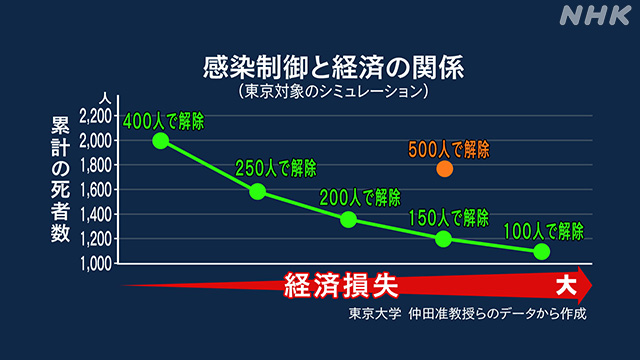A group of economics experts published a simulation analyzing the effects of infection control in Tokyo and the economic impact of the declaration of emergency for measures against the new coronavirus, and reduced the number of infected people sufficiently in the shortest possible time. If the declaration was lifted after that, the result was that the re-spread of the infection was suppressed and the economic loss was reduced.
The simulation was conducted by a group of Associate Professor Taisuke Nakata and Specially Appointed Lecturer Daisuke Fujii of the Graduate School of Economics, the University of Tokyo.
Based on the data up to the 24th of last month, the group analyzed the economic impact after the declaration of an emergency by combining a mathematical model that predicts the spread of infection and an economic model.
In the analysis, as a prerequisite for Tokyo, it was assumed that if the number of infected people exceeds 2000 per day, a state of emergency will be declared again and vaccination will proceed smoothly.
Then, we simulated each number of infected people in Tokyo per day when the declaration was lifted.
According to the results, if the declaration was lifted by 500 people a day, the number of infected people would start to increase immediately, and the state of emergency would be required again in the latter half of April.
If the vaccine was lifted by 250 people a day, the number of infected people would increase relatively slowly, and if the vaccine went smoothly, the number of infected people would decrease after mid-June. is.
Furthermore, by adding the impact on the economy to this analysis, we calculated the change in total production in Tokyo as the cumulative number of deaths and economic loss expected in Tokyo over the next year.
As a result, if the declaration was lifted when the number of infected people per day was 400, the death toll in Tokyo would rise to about 2000.
If it is lifted with 250 people, the death toll will be reduced to about 1600, but the period of restricting economic activities will be longer, so the economic loss will increase by about 100 billion yen.
In addition, when canceling with 100 people, the number of deaths decreased to about 1100, but the economic loss increased by about 410 billion yen, and the stricter the criteria for canceling, the greater the economic loss.
However, if the declaration was canceled with 500 people a day, an emergency declaration would be issued again, and the number of deaths would increase to about 1800 and the economic loss would increase by about 310 billion yen. is.
Based on this analysis, the group states that by sufficiently reducing the number of infected people in the shortest possible time and then canceling the declaration, the re-expansion of infection will be suppressed and the economic loss will be reduced, and the balance between infection control and the economy will be considered. However, he pointed out that the policy should be determined.
Associate Professor Nakata "Release when you feel confident to some extent"
Associate Professor Taisuke Nakata of the University of Tokyo Graduate School of Economics, who conducted the analysis, said, "The idea that the state of emergency should be canceled at a timing when you can be confident that you can avoid another state of emergency is the idea of infection control. It has become clear that the idea is correct not only from the perspective but also from the perspective of economic activity in the medium to long term. I think that these analysis results will be helpful for policy decisions. The analysis will be updated weekly on the website, so I want you to use it actively. "

